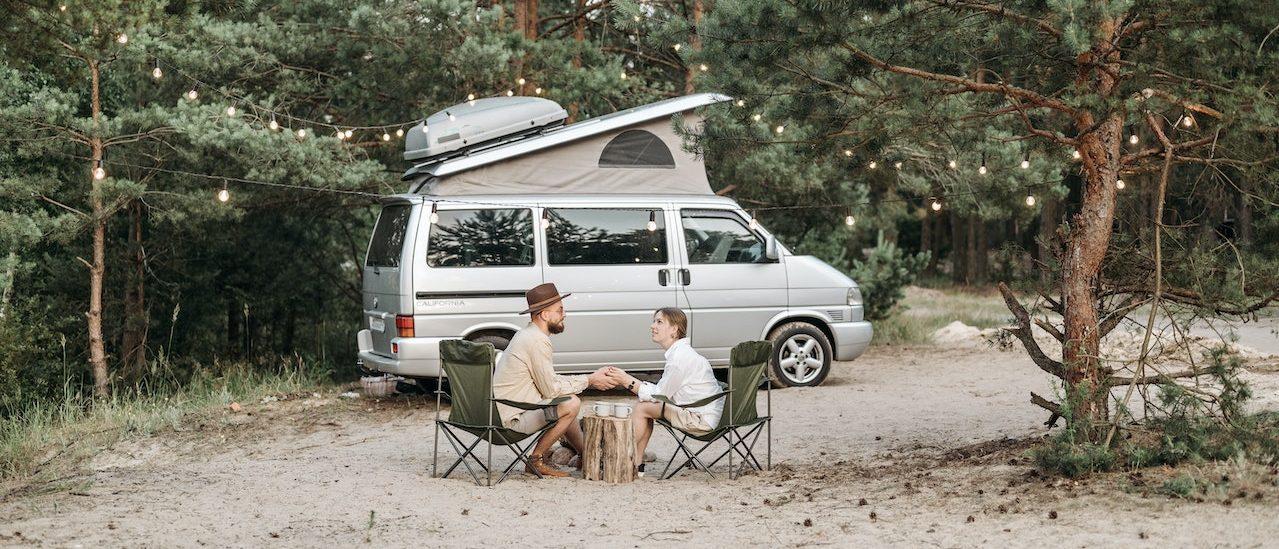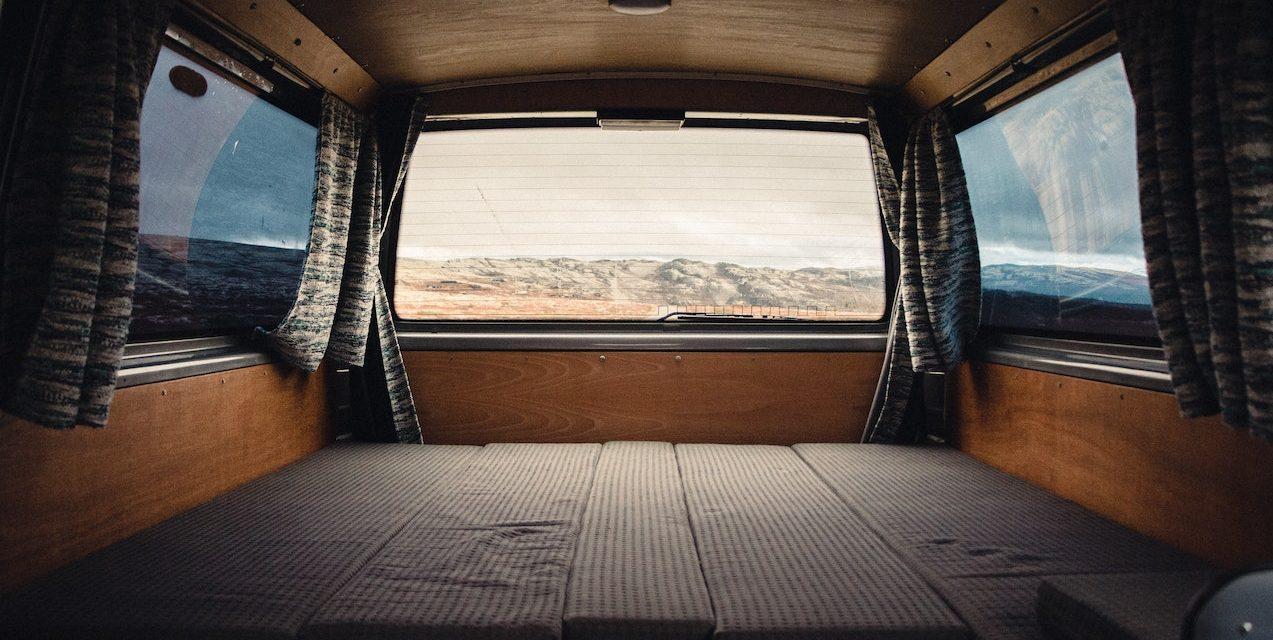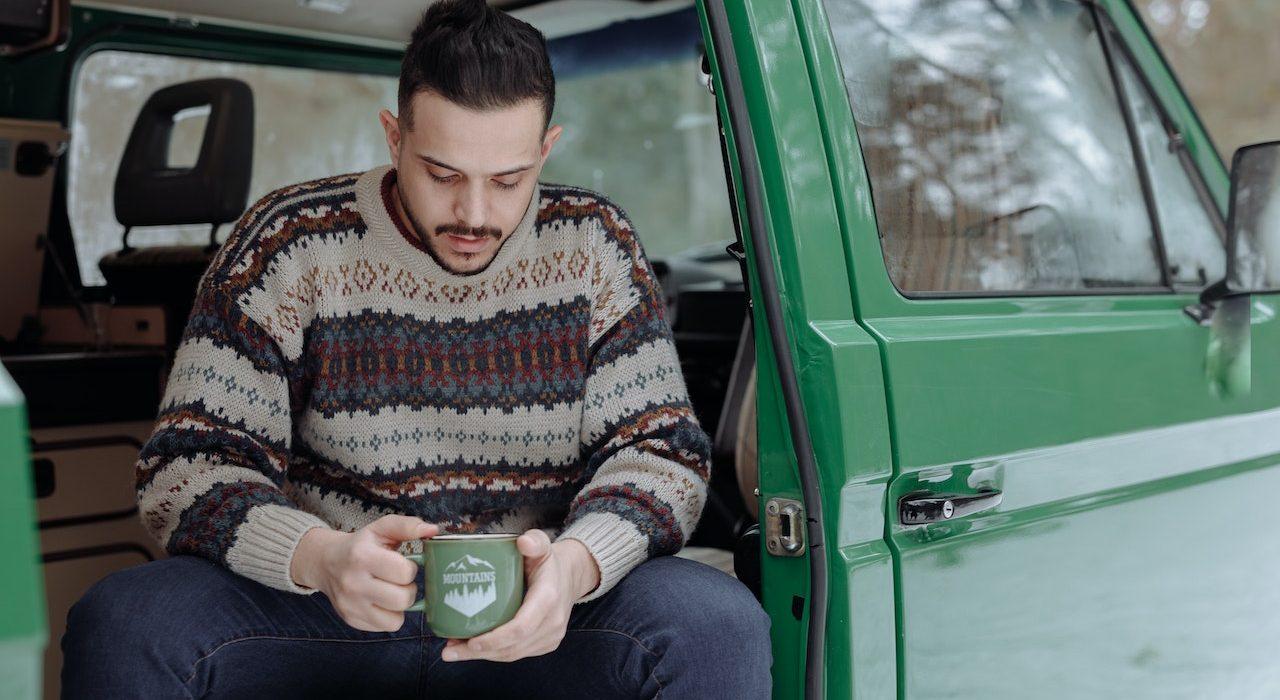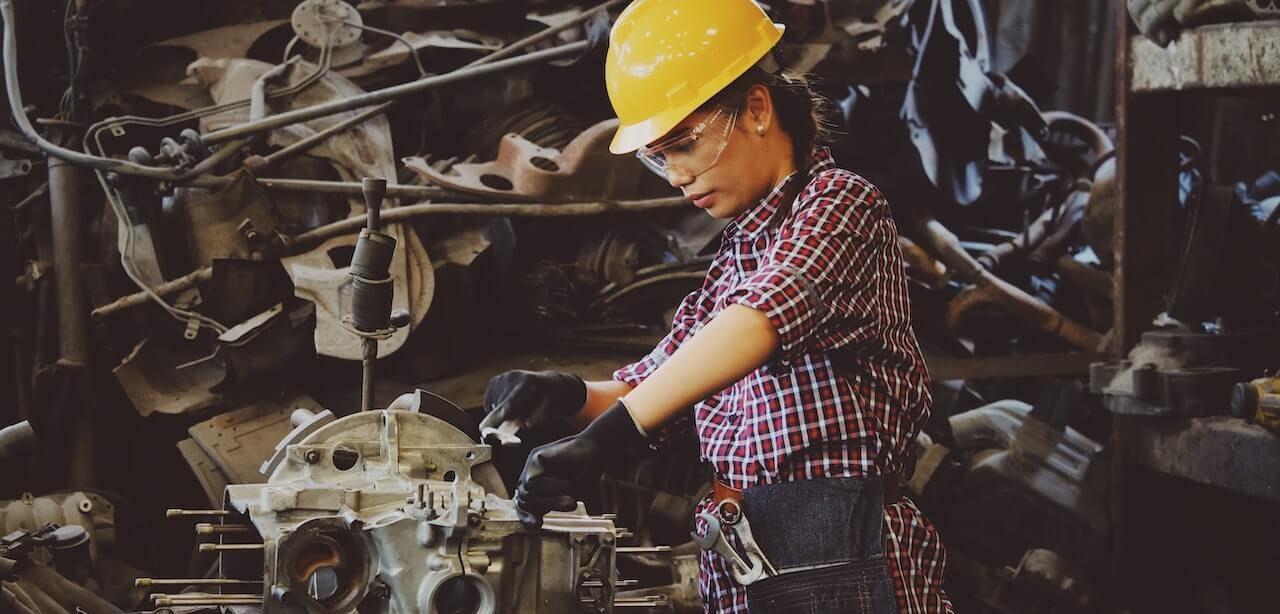If you want to embrace freedom and hit the road in a campervan, you need to consider how to get the campervan that suits your needs.
There are several factors you should consider before jumping in and spending your hard-earned cash. After all, campervans aren’t cheap, so making a mistake could leave you out of pocket and unhappy.
When you’re deciding how to buy your campervan, there are three options you can choose from:
- Buying a new campervan
- Renovating an old camper or converting a van yourself
- Using a campervan conversion specialist to renovate a van or old campervan
In this article, we’re going to compare buying a new van to using a professional to renovate a van or campervan for you.
We’ll look at the key factors throughout, including:
- Cost
- Time frame
- Quality
- Length of use
- Type of use
- Laws & regulations
- Pros and cons
Campervan conversion vs buying a campervan: factors to consider

Get your pen and pad ready, we’re about to go into the key factors you need to consider before buying your campervan. We’ll take an in-depth look at each factor, summarise the pros and cons and then provide you with an alternative solution at the end.
Cost
Whether you’re buying a campervan or doing your weekly shopping, everyone considers their budget before they go out and spend their cash. And while you might not regret buying that extra packet of biscuits when doing your shopping, buying the wrong campervan can hurt your finances.
How much does a professional campervan conversion cost?
As a rule, most quality campervan conversions start around £7000. While it’s possible to get a cheaper conversion, you need to ensure your camper meets regulations and offers you the experience you want.
Visit websites like Quirky Campers, which has a van conversion directory with listings, prices and services from various campervan conversion companies in the UK, including us.
There are usually three service options converters offer:
- Stock conversions – ‘stock models’ allow converters to keep the cost of parts down and production times quick by creating similar vans like our Bhode One and Bhode Two builds.
- Bespoke conversions – the sky is the limit with a bespoke conversion, and it’s more about giving you the van of your dreams, like our Bhode Bespoke build. Make sure you choose a converter to help you determine the budget to avoid any nasty surprises.
- DIY support – some converters will offer you a basic package of support for tasks you can’t complete yourself, like our Bhode Artisan build. They can help with jobs like electrics, cladding or solar panels, which allow you to keep costs down. You can also find tradespeople with specific skill sets if you only need one or two jobs.
Read our blog for a comprehensive look at how much it costs to convert a campervan, which includes a breakdown of pre-build costs, build costs and post-build costs.
How much does it cost to buy a new or second-hand campervan?
When buying a ready-to-use campervan, there are two options: buy a new campervan or a second-hand campervan that’s roadworthy.
A new campervan is going to cost more than a second-hand campervan, so have a look around and get a ballpark figure for how much each one will cost. Some converters may even stock converted campervans, so it’s worth enquiring.
One of the cheapest options on the market if you’re buying new is the VW Caddy California, which is a small, compact campervan – prices start around £32k. However, this vehicle is unique, and most other small vans are conversions.
If you want a pop-top camper or a proper motorhome, you’ll be looking at £50k plus, and some even cost as much as a house.
If you’re buying second-hand, you can pick up vans such as the Mazda Bongo, Ford Transit conversion or VW T4 for between £5-20,000, but do your research so you know you’re buying a reliable van that suits your needs.
If you’re thinking of going electric or hybrid, it’ll cost more. For example, the Volkswagen I.D. Buzz Life starts at £58915, and will only get more expensive with extras and add-ons.
Time frame
Before you go out and buy your van, think about when you’d like to be sat behind the wheel driving it.
Buying a campervan isn’t a spur-of-the-moment buy, and you’ll need to do plenty of research on whatever option you pick. It’s good to go in with knowledge of what you want, as you’re more likely to get it.
Use the expertise of the sales staff or converter to guide you, but don’t let anyone push you into something you feel unsure about.
When you’ve done your research, you can decide which method to use. And buying new is the quickest way to get on the road. After all, you can walk into a dealership and get your van on the same day. There’s also an element of security, as you’re covered by a warranty.
Likewise, buying second-hand can be quick as well. All you need to do is message the seller, view the van and sort the paperwork and payment out. You could have your van in less than a week.
A van conversion will take longer, especially if the converter has a waiting list. Converters will try to book work in advance, so they’ve always got projects to rely on for income. A waiting list isn’t a bad thing, it shows that people are willing to let the converter work on their van.
Remember, it’s your timeframe whichever option you choose. Go at your own pace and ensure you’re happy with how things are proceeding.
Quality

If you’re buying a van new, you expect it to be in excellent condition. And even if you do have problems with it, you’ll be covered under your warranty.
Buying from a company like Volkswagen, you know the company has a history of making quality campers, so it’s not something you’d need to be too worried about.
Buying second-hand is a little different. There are so many factors that determine the shape the van is in, such as mileage, service history and the number of owners. If you don’t do your research, you could end up getting stung.
You need to make sure you research the van and look into the owner or dealer selling the van. There’ll usually be some indicator of whether you can trust them, like reviews.
Apply the same logic when working with a converter. Research the van you want them to convert, look at previous examples of their work and read their Facebook or Google reviews. You’ll soon get an idea of their service quality and whether you should use them.
You can also ask them about any warranties or guarantees they offer post-service, so if things do go wrong, you’ve got some cover.
Length of use
It all comes down to common sense. If you’re planning to get 20 years’ use from your van travelling throughout Europe, it wouldn’t be a good idea to convert a second-hand van with 80,000 miles on the clock. You could end up calling out your breakdown insurance more than you’d like!
If you’re buying a new campervan, you’ll get a few years’ warranty anyway and there’ll be some resale value if you want to sell your van and upgrade in the future. So while the initial outlay will be more, you’ll be able to retain some of the cash in the future.
Buying second-hand will mean your vehicle is cheaper, but it can still be quite expensive. We found a 2014 Transporter on Autotrader with 45,000 miles on the clock for £25,000. If you rack up a lot of miles, you could hit 100,000 and knock more value off the van.
If you’re considering converting a van, you can pick up a van with less than 20,000 miles on the clock for £6000+. When it comes to value for money, it’s the best option. Plus, it opens more customisation options and you can personalise your camper.
When it comes to convenience, buying a new van is the best option for getting longer use from your van, but from a cost perspective it’s converting a van.
Type of use

When buying your van, think about what you’re going to use it for. If you’re a family of four using it for occasional holidays, then a Citroen Berlingo is out of the question. You’ll need more space, and space means spending more cash.
Plus, if you’re only using it sporadically, is it worth splashing out £50,000+ on a brand-new motorhome or camper?
If you’re renting out your campervan, you’ll want a reliable quality van. But will buying new or converting a van give you the best return on investment?
There’s no right or wrong answer here, everyone uses their van for different reasons, and yours will be unique as well.
For example, many people who live out of their vans choose to get conversions because it keeps costs down and allows them to personalise the van to their lifestyle. And campervans are a way for many people to express their style.
Think about what you want to use the van for and base your decision on that.
Laws & regulations
If you’re buying a new campervan, you have the assurance that it meets the laws and regulations that allow you to use it on British roads. Most manufacturers sell vans in other countries as well, so they should meet their regulations. But it’s worth checking with your dealer.
If you’re buying second-hand or going for a professional conversion, you’ll need to check if it’s had any work done to it and whether it meets regulations or be confident that your converter can deliver a van that meets regulations.
If you don’t get a van that meets regulations, you could end up in trouble with the law, which can be expensive and damaging to your driving record. You’ll also have to get the van repaired and find somewhere to store it if you keep it on the road. Plus, there’s the added stress that takes away the joy of owning a campervan.
You’ll need to let the DVLA know about your conversion and ensure it meets their criteria.
DVLA requirements for van conversion: How to make your van road legal
Pros and cons
When you’re buying a campervan it’s important to think of the pros and cons, so you can come to a decision. Here are a few for each method of buying:
Buying new pros
- Warranties give you peace of mind
- Lots of customisable options
- Convenient and quick
- Other extras like servicing
- Satisfaction of owning a new van
Buying new cons
- Costs can spiral out of control
- Failing on payments could cause problems
- Isn’t as personal as a conversion
Buying second-hand pros
- Cheaper than buying new
- Could get a converted van
- Plenty of options
- Fairly quick
Cons of buying second-hand
- Do you trust the seller?
- Less chance of a warranty/guarantee
- Higher mileage
- May not meet regulations
Pros of conversions
- Cheapest option
- Create a van that suits your lifestyle and personality
- Plenty of van options
- Work at your own pace
Cons of conversions
- Do you trust the converter?
- Higher mileage
- Less chance of a warranty/guarantee
Case Study: Transforming a Peugeot Boxer into Ophelia
Alternative solutions: renovating a van or camper yourself

If you’re interested in converting a van, but you have some or all the skills required to do it (or you’d like to learn how!), a DIY conversion could be the route for you to take.
Campervan conversion vs buying a campervan: what should you pick?
While you may not know what route to go down yet, we hope we’ve given you the information that will help you make a decision. If you are thinking about converting a campervan, you can visit our blog for more information or get in touch with us to discuss your options.

